Bodily boundaries or how the world told me I hated affection
 A blog written by student staff member Sydney about her journey with understanding bodily boundaries, consent, and the perpetuation of rape culture in society. Including tips about consent in daily life and resources to stay informed and about how to talk to kids and other adults about the issue.
A blog written by student staff member Sydney about her journey with understanding bodily boundaries, consent, and the perpetuation of rape culture in society. Including tips about consent in daily life and resources to stay informed and about how to talk to kids and other adults about the issue.
If you would have asked me a month ago how I felt about touch and affection, I would have told you I straight up hate it. For years I’ve thought I was someone who just doesn’t want to be touched at all (I’m talking cuddling, PDA, hugging family…let alone kissing family, sitting a bit too close to someone, or OMG SHARING BEDS)… and in some ways this is still true. For example I will never want to be cuddled while I sleep. This is ME time, don’t touch me!

BUT after some self-reflection and some therapy, I’m realizing that the issue is not that I don’t like to be touched or that I’m never okay with physical affection. It’s that I like certain forms of physical affection and I don’t have a problem telling other people what I want.
Unfortunately, other people find my self-awareness and assertiveness weird or wrong. Our society socializes women to think that we SHOULD want to be touched and that men should WANT to touch us (I’m using heteronormative terms here for a few reasons. 1. Because that’s the message I received growing up, and because society still looks at heterosexual couples as the norm, I think a lot of times this is the message many of us get and 2. Because I’m interested in the gendered understanding of this phenomena and how it creates tensions within consent discourse). If we deviate from that norm we feel like something is wrong. For example, here are some responses I’ve gotten when explaining not wanting to be touched to people: “but he’s your boyfriend” , “you’re such a dude”, “you’re cold/ cold- hearted”… the list goes on.
I’m okay with not liking certain forms of touch or affection; however other people have constantly been confused by it which led to me internalizing some of it subconsciously. People either seem to not understand my bodily boundaries, let along respect them, or think I’m weird for having any in the first place. Why is this an issue? Because it teaches us that knowing our boundaries and desires is abnormal and it ultimately reinforces rape culture. Yep, I went there.
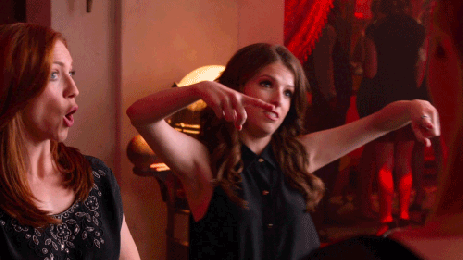
NOT LIKING TOUCH AT CERTAIN TIMES, IN CERTAIN WAYS, OR BY CERTAIN PEOPLE DOES NOT MAKE ME COLD HEARTED, IF ANYTHING IT MEANS I AM IN TOUCH WITH MY BODY AND KNOW WHAT I LIKE AND DO NOT LIKE WHICH IS SOMETHING WE SHOULD BE TEACHING EVERYONE, FROM THE BEGINNING.
This blog came about from a mixture of therapy where I’m learning to be emotionally vulnerable (that’s a whole different blog…more like a book, though) as well as a trip to New Orleans where I had reached my limit in terms of explaining myself. While discussing the fact that I “don’t like to be touched,” someone I was with asked me:
“What happened to you as a child?”
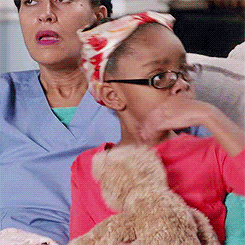
Here’s the short answer to that: Nothing.
Now here’s the long response.
-
- Don’t ask people this, especially people you may not know well because guess what… ? It’s NONE OF YOUR BUSINESS.
- This insinuates that something sexually traumatic (or at the very least physically traumatic) had to happen to me as a child, which is not only completely ignorant in the terms of this conversation but also could be retraumatizing for someone who has experienced sexual or physical harm.
- YOU DON’T NEED A REASON TO PLACE BOUNDARIES ON YOUR BODY.
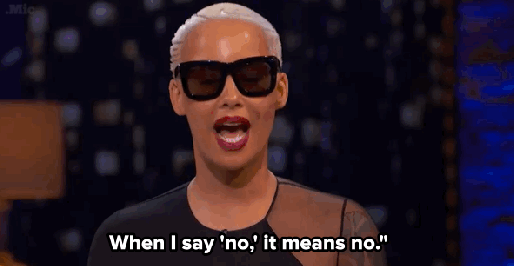
This belief that someone has had to go through something traumatic in order for them to place limits on their own body and know what they like and do not like is downright harmful. It seeps into how we raise our children, how we parent our teenagers, and how we perpetuate rape culture in our lives. It is the reason why people struggle with saying or accepting “no”. No before sex, no during sex, and no in terms of things that aren’t related to sex. It is also why some people don’t understand that the lack of a no IS NOT A YES.
I mean look at the images and messages we give to kids and adults about sex and consent. We acknowledge that “no seems to mean yes” in Disney’s Hercules ( a children’s cartoon) we then reinforce this by “playfully” saying no but really meaning yes in Pitch Perfect, a movie targeted at young women and then music touches on this “I know what you really want” (go away “Blurred Lines”) narrative all the time. The Notebook, a “love story for the ages” has the man threatening to jump from a Ferris wheel if the girl doesn’t agree to a date. And then we reach adulthood, alcohol companies market to people by hinting at roofies and being so drunk you “won’t say no”. But yet we expect people to navigate this media and know what is right and what is wrong? How?
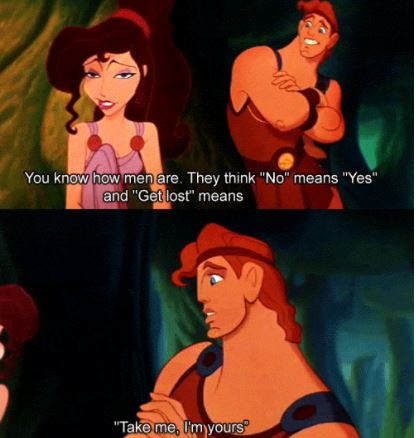





In order for bodily boundaries and autonomy to be realized by all people we need to consciously and actively teach consent. Consent in sex education, consent in relationships (all of them), and consent for children. In order for adults to look at people taking a stand over their body, wants, and needs, we need to teach our children that they can say no to touch at any time from any one and that they can tell us when they feel uncomfortable (I’m talking kisses, hugs, sitting on laps, and, yes, even high fives). We need to teach adults that this is okay and that affection or gratitude can be shown in other ways, and that that is normal. We need to teach children what age appropriate consensual touching looks like, yes this means SEX ED.
So what are some ways we can incorporate consent into our daily lives, parenting, and relationships? Aside from the things above about teaching consent early, here are a few tips that are helpful for me when I’m feeling frustrated…
- Ask people before you hug someone. This may seem simple or silly but some people do not like to hug and THAT’S OKAY. Asking allows them to say no to a situation that may make them uncomfortable. They may want a high five instead. Personally, some days I want to hug and other days I don’t, especially with people I may not know very well. You can also ask for touches when you need them as well, but people still reserve the right to say no.
- Shoutout to Reese for having this exact respectful conversation the other day. She listened, questioned, and then accepted what I had to say. And even though she may be an affectionate person, she always asks others “would you like a hug or high five” when saying hello and goodbye. sometimes people respond with neither, or how about a fist bump, and they go from there. Phrases like Would you like a hug? Is it okay to hug you? Are important and may start off awkward but get easy when we practice them regularly.
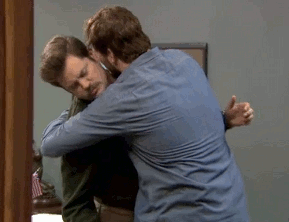
- Don’t be afraid to express your boundaries. I’m very open about my limits from the get go, no matter the situation. When sharing a hotel room bed (with a romantic partner, friend, classmate, etc.) for the first time, I make sure to tell them I’m not a cuddler, I explain that I may not always want to be touched to people, I explain that I don’t like to be “smothered”. I also continuously reinforce these boundaries.
- Example: Someone touches me when I don’t want to be? I say: “Please stop that” They don’t stop? “I’m being serious I don’t like that” Still touching? “If you touch me again I will kick you…. Guess what comes next. If I’m touched again, you got it, I kick em.
→ I realize this doesn’t work for everyone or in every situation but if you have healthy relationships and friendships I would hope you’d be able to discuss your boundaries and have them respected.
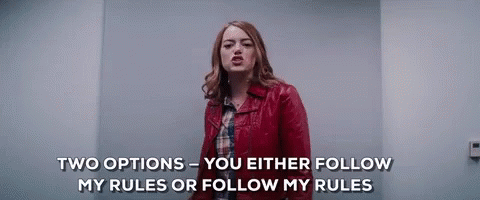
- Remember that consent is not just about sex, it’s not even just about affection. This is a super complex issue and there are a lot of people that we steal bodily autonomy from regularly based on their varying identities. Think about when someone touches a Black woman’s hair (don’t do that. Just don’t, even if you ask) and how that invades her right to her body and her space. Consent also isn’t always about touching, think here about Trans individuals who are constantly asked if they “got the surgery” (also don’t do this). It’s none of your business, it’s personal, it’s intimate, and a person’s gender identity/expression does not give you the green light to ask such a question.
These conversations aren’t easy because society doesn’t give us space to discuss bodies and sex, but they’re necessary and important. They may be awkward and people may not understand but that’s why we need to start teaching children at younger ages, so that there may come a time when we don’t have to continuously have these talks as adults.
Feeling overwhelmed? Confused? Or just want some more information? Check down below for a list of resources regarding consent at all ages, sexual education, and rape culture/toxic masculinity and the effect it has on both women and men
Resources:
- Children
- I Said No! was written by a boy named Zack and his mother to help him cope with a real-life experience and includes discussion on how to deal with bribes and threats.
- My Body Belongs to Me, is about a child who gets touched inappropriately, so prepare to have a thoughtful conversation after reading together.
- No Means No! stars an empowered young girl and includes a “Note to the Reader” and “Discussion Questions” to aid crucial dialogue.
- Teens and Up
- The Hunting Ground is a companion book to the documentary of the same name that delves into the rape culture prevalent on college campuses.
- Sexual assault survivors from every kind of college and university and multiple backgrounds share their stories in We Believe You, which Elizabeth Gilbert called “one of the most important books of the year.”
- Asking for It by Kate Harding explores the idea that our culture supports rapists more effectively than it supports victims.
- Michael J. Domitrz takes a friendly, collaborative approach to the topic of express consent in Can I Kiss You?
- Yes Means Yes! Visions of Female Sexual Power and A World Without Rape
- On Teaching Consent: Ask. Listen. Respect. In the classroom. By Age, How to instill boundaries, Physical and Emotional Boundaries
- On What Consent Means: here, here, and here
- Sex Ed Resources: Sex Ed Rescue (Includes puberty, consent, sex, and ebooks), Lesson Plans and Legislation, For Parents, Planned Parenthood, Ability Based Sex Ed
- On Fighting Rape Culture: What rape culture is, Steps to take, What rape culture sounds like
- Other
- The yes no maybe so checklist is AMAZING. It goes over all different forms of touch and asks you to rate them on if you like it, don’t like it, or could maybe be into it. You can even rank things as hard or soft limits and discuss how they may vary depending on the situation.
- The Hunting Ground: Documentary on Netflix. This exposé tackles the disturbing epidemic of sexual assault on college campuses and school officials’ efforts to cover up the crimes.
- The Mask You Live In Documentary on Netflix. The Mask You Live In follows boys and young men as they struggle to stay true to themselves while negotiating America’s narrow definition of masculinity. Pressured by the media, their peer group, and even the adults in their lives, our protagonists confront messages encouraging them to disconnect from their emotions, devalue authentic friendships, objectify and degrade women, and resolve conflicts through violence.
- The Women’s Center’s Supporting Survivors of Sexual Violence Workshop (Check MyUMBC for events next semester)
Posted: April 26, 2018, 1:32 PM